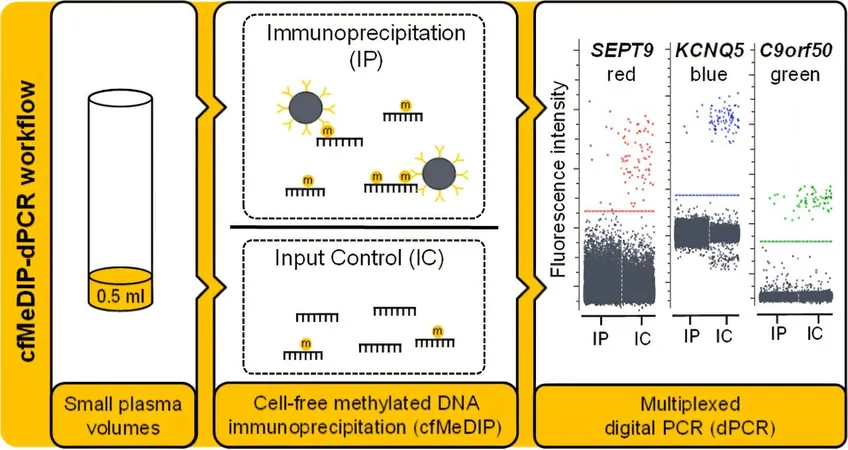
Shocking Surge: Why Bowel Cancer Cases Are Surging Among Young Adults Under 50!
2025-01-19
Author: Ming
Bowel cancer, also known as colorectal cancer, is the third most prevalent cancer globally, with nearly 2 million cases diagnosed each year. Traditionally, this disease has predominantly affected individuals over the age of 50. However, recent years have witnessed a disturbing spike in bowel cancer diagnoses among individuals under 50, raising alarm bells in the medical community and prompting a deep dive into potential causes.
A striking study from 2019 highlighted that in seven high-income countries where bowel cancer rates had historically been high, cases among the over-50 demographic began to stabilize or decline, thanks to effective screening programs that detect precancerous conditions early. Conversely, the same research revealed an upward trend in bowel cancer cases among younger populations in these countries. Norway, for example, reported that individuals born in 1990 faced a five-fold increase in the risk of developing rectal cancer compared to their peers born in 1920.
Further emphasizing this alarming trend, a larger study spanning 50 countries confirmed that the rise in bowel cancer diagnoses is a global issue. Countries from Europe, Latin America, the Caribbean, and Asia are witnessing significant increases in cases among those under 50. While the exact causes remain unclear, experts suspect that lifestyle changes are playing a crucial role in this concerning rise.
The Lifestyle Connection
Decades of research underscore the influence of lifestyle and environmental factors on the risk of developing bowel cancer. Historical data indicates that ethnic Japanese individuals living in the U.S. had much higher bowel cancer rates than their counterparts living in Japan, suggesting that adopting a Western lifestyle could significantly elevate risk.
Factors that have been consistently linked to an increased risk include low physical activity levels, high consumption of red and processed meats, low dietary fiber, obesity, alcohol consumption, and smoking. Notably, Cancer Research UK estimates that over half of bowel cancer cases in the UK are linked to preventable causes.
The dramatic shift towards a Western diet, characterized by low nutritional value and high-calorie intake, began permeating regions like Japan during rapid economic changes in the last few decades, leading to a staggering rise in bowel cancer rates in that country as well.
The Global Obesity Epidemic
Compounding the issue is the global obesity crisis—it is estimated that 2.2 billion people are overweight, with 890 million classified as obese. Alarmingly, the rates of obesity among children and adolescents have skyrocketed ten-fold since the mid-1970s. Childhood obesity detrimentally impacts metabolic health, triggering chronic inflammation and hormonal imbalances that could facilitate cancer development.
Moreover, the health of our gut microbiome, a crucial factor in overall well-being, is heavily influenced by dietary choices. A Western-style diet disrupts the delicate balance of gut bacteria (dysbiosis), fostering environments ripe for disease. Evidence suggests that dysbiosis may exacerbate the risk of bowel cancer, especially amongst younger individuals.
Unfortunately, bowel cancer in those under 50 is often detected late, partly due to screening programs that focus on older populations. A recent survey by Bowel Cancer UK revealed a worrisome lack of awareness about bowel cancer symptoms among younger individuals and their healthcare providers.
Recognizing the Warning Signs
Early detection significantly enhances survival rates, making awareness of symptoms vital. Common signs of bowel cancer include abdominal pain, blood in stools, alterations in bowel habits, and unexplained weight loss. While these symptoms can occur for reasons other than cancer, it is crucial to consult a healthcare provider for evaluation.
Take Control: Here’s How to Reduce Your Risk!
To takeaway, adopting a healthy lifestyle can greatly reduce the risk of developing bowel cancer, regardless of age. Emphasize a balanced diet rich in whole foods, reduce intake of ultra-processed foods and limit alcohol consumption, refrain from smoking, and prioritize regular physical activity.
As the health crisis surrounding bowel cancer among younger populations grows, proactive measures and heightened awareness will be key in combating this rising tide. Don't wait—reassess your lifestyle choices today and take charge of your health!






 Brasil (PT)
Brasil (PT)
 Canada (EN)
Canada (EN)
 Chile (ES)
Chile (ES)
 Česko (CS)
Česko (CS)
 대한민국 (KO)
대한민국 (KO)
 España (ES)
España (ES)
 France (FR)
France (FR)
 Hong Kong (EN)
Hong Kong (EN)
 Italia (IT)
Italia (IT)
 日本 (JA)
日本 (JA)
 Magyarország (HU)
Magyarország (HU)
 Norge (NO)
Norge (NO)
 Polska (PL)
Polska (PL)
 Schweiz (DE)
Schweiz (DE)
 Singapore (EN)
Singapore (EN)
 Sverige (SV)
Sverige (SV)
 Suomi (FI)
Suomi (FI)
 Türkiye (TR)
Türkiye (TR)
 الإمارات العربية المتحدة (AR)
الإمارات العربية المتحدة (AR)